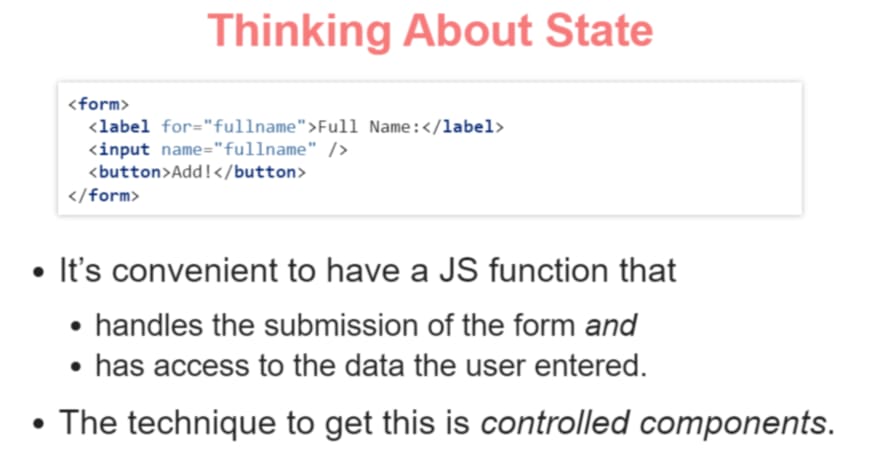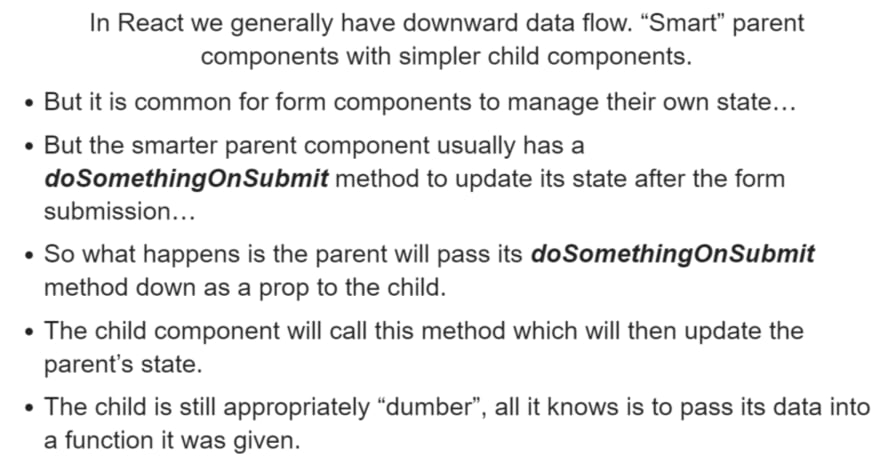This content originally appeared on DEV Community and was authored by Web.Developer.io
What
Forms → They are used to take in the use Input.
Goals :
- Build Form with React
- Understanding What Controlled Component are
- So in the HTML forms , they have their own state , the whole Application doesn’t know about the Form’s Data until we hit
Submit.
So they are Called the Un-controlled Component , Where Site can’t access the form data.
When our app has access to the form Data they are called the Controlled-Component.
In the case of HTML the Form has it own State and it changes based on the User-Input.
But in React , We keep all our mutable data in the State and set it using the setState.
So how do we Control the React State ??
So we keep all our mutable data in the State , So what we can do is to store the User-input in the State.
Let’s have a look on this Example 👇
import React, { useState } from "react";
function ControlledForm() {
const [Text, setText] = useState("Enter Your Name");
const handleSubmit = (evt) => {
evt.preventDefault();
alert(`The value u Entered is ${Text}`);
};
const handleChange = (evt) => {
setText(evt.target.value);
console.log(Text); //It is a Asynchronomus process so it will take some time.
};
return (
<div>
<h1>Controlled Form</h1>
<form>
<input onChange={handleChange} value={Text} />
<button onClick={handleSubmit}>Submit</button>
</form>
</div>
);
}
export default ControlledForm;
- So in the Input tag we have set the value attribute to be
Text(which is a State). - The Function
handleChangeruns on every keystroke to update the React state, the displayed value will update as the user types. - With a controlled component, every state mutation will have an associated handler function. This makes it easy to modify or validate user input.
The HandleClick Method →
const handleClick = (evt)=>{
setText(evt.target.value);
console.log("Updated!!!");
}
Handling Multiple Events →
What if we want to use multiple input tag , Do we have make new onChange event Handler for Everyone??
- The answer is NO!
- So we can Compute a Property in the Object also using the
square-brakets []
Like this 👇
- So Instead of making separate
onChangehandler for every single input , we can make some generic function.
- To do so first we have include the
nameattribute to the input tag , and the name should match to the one we have declared in the state. - And in the
handleChangefunction we have to use the square braces to make changes in the right place.
import React, { useState } from "react";
function MultiInputForm() {
// const [Text, setText] = useState("");
//We have defined a Object.
const [Text, setText] = useState({ Name:"", Email:"", Number: "" });
const handleSubmit = (evt) => {
evt.preventDefault();
alert(`The value u Entered is ${Text.Name} ${Text.Email}`);
};
const handleChange = (evt) => {
// In this we are restoring the res ones and only changing the requierd ones.
setText({ ...Text, [evt.target.name]: evt.target.value });
// console.log(Text); //It is a Asynchronomus process so it will take some time.
};
return (
<div>
<h1>Multiple Input Form</h1>
<form>
{/* Be carful while setting the name it should be same as that u have entered in the state */}
<input onChange={handleChange} value={Text.Name} name="Name" />
<input
onChange={handleChange}
type="email"
placeholder="Enter Email"
name="Email"
/>
<input
onChange={handleChange}
type="number"
placeholder="Enter Mobile Number"
name="Number"
/>
<button onClick={handleSubmit}>Submit</button>
</form>
</div>
);
}
export default MultiInputForm;
The HTML For
When ever u are using the label use htmlFor instead of for.
Cuz for is a Reserved word in the javaScript same with the instead we should use the className cuz class is also a Reserved keyword.
Passing Data to Parent Component
- So Forms are generally Stateful so there should be a way to pass the state to the parent Component.
So we make a Form Component and changes it’s state using handleChange Function and after on submit we have an handleSubmit function which then call the Function which we passed as props and send the state as an argument and
then in parent Component we get that state and update the changes.
Shopping List Example
Keys and UUID
Happy Coding ☺️
This content originally appeared on DEV Community and was authored by Web.Developer.io
Web.Developer.io | Sciencx (2022-01-16T19:02:36+00:00) Forms In React | Day 13. Retrieved from https://www.scien.cx/2022/01/16/forms-in-react-day-13/
Please log in to upload a file.
There are no updates yet.
Click the Upload button above to add an update.












